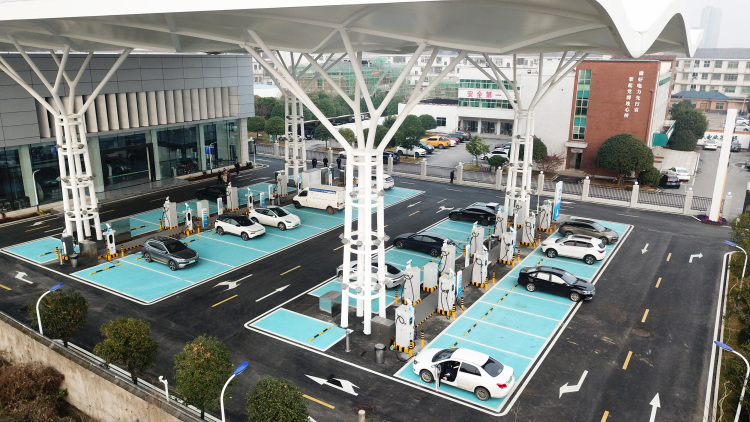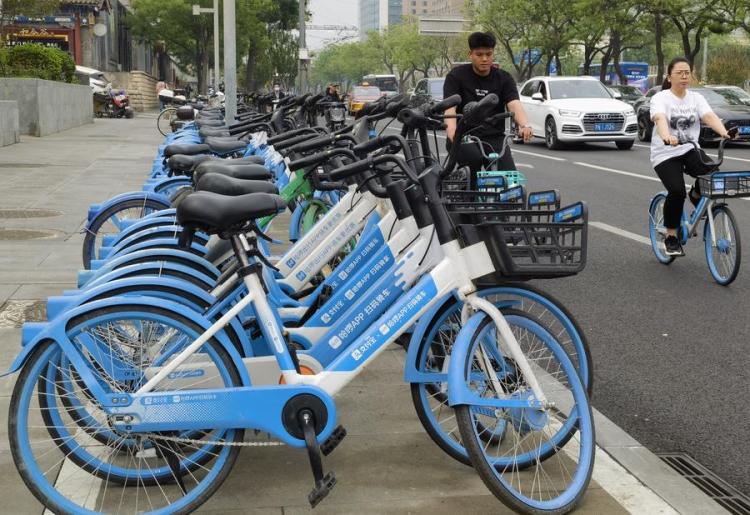*A growing number of young Chinese are embracing a low-carbon lifestyle, opting for electric cars, public transport, and products with a low-carbon label.
* The country's drive to realize "dual carbon goals" has served to raise public awareness and nurture an expanding market for green products.
* Many Chinese companies are catering to consumers who are increasingly conscious of their carbon footprint.
GUANGZHOU, April 22 (Xinhua)
For Yang Mengming, commuting via electric buses, removing disposable chopsticks from takeout orders, and using her own coffee cup instead of a disposable one have all become routine.
The 30-year-old white-collar worker in south China's tech hub Shenzhen has purchased a new energy vehicle (NEV) for personal use and prefers products with a low-carbon label, even if they are priced slightly higher than others.
"Everyone can contribute to environmental protection within their means, which, in the long run, will benefit everyone," Yang said.
Yang represents a growing number of young Chinese who adopt a low-carbon lifestyle, as the country's drive to realize "dual carbon goals" serves to raise public awareness and nurture an expanding market for green products.
Wang Jingjun, a postdoctoral student in central China's metropolis of Wuhan, always carries a cloth bag to skimp on plastic bags and looks out for the low-carbon label on products when shopping.
"I'm glad to find that there are more and more low-carbon products in recent years, from paper towels, sanitary napkins, shampoo, furniture to home appliances," said the 31-year-old postdoctoral fellow at Huazhong University of Science and Technology.
RISE OF LOW-CARBON MARKET
Many Chinese companies are catering to consumers who are increasingly conscious of their carbon footprint.
On Monday, a Shenzhen-based company released a zero-carbon open-ear headphone. The Cleer ARC 3, produced by Shenzhen Grandsun Electronic Co., Ltd., obtained the carbon-neutral certificate by maximizing the use of recyclable materials, green electricity and equipment with low power consumption.
Wu Haiquan, president of the company, said they have been inspired by the nation's "dual carbon goals," which aim to peak carbon emissions by 2030 and realize carbon neutrality by 2060.
"Low-carbon consumption will become an inevitable trend as the government rolls out green policies and promotes low-carbon awareness," said Wu. "It's better for companies to act sooner rather than later, seizing the opportunity and staying ahead of the curve."

Another Shenzhen-based jewelry company -- Yuepeng Gold -- last year released its first zero-carbon gold bar product by utilizing recycled gold and transitioning to energy-saving production.
The zero-carbon gold bar received a warm reception from consumers, and were sold out within minutes during China's mid-year online shopping festival known as the "618" shopping festival, according to the company.
Remarking on the market prospects of carbon-neutral products in China, Mickael Lefebvre, chief technology officer of Grandsun, said an ecosystem of such products is rapidly taking root in China, which benefits the development of new carbon-neutral products.
China is already the largest market for NEVs, with domestic sales reaching 8.29 million units last year.
"If consumers have already bought electric cars and fridges that emit less, then it's not a big leap for them to think their other devices need to have smaller carbon footprints," Lefebvre said.
Jiang Zechuan, an official with the ecology and environment bureau of Shenzhen, attributes the increasing popularity of low-carbon lifestyles to governmental guidance, corporate innovation, and public participation.
"The government shall first provide guidance and encourage businesses to engage in research and development of low-carbon products. It shall then encourage consumers to choose such products and form low-carbon consumption habits," said Jiang.

LOW-CARBON LIFESTYLE
Zhao Chengzhu, a 30-year-old Beijing resident, has formed a habit of riding a bike for short-distance commuting.
"In a metropolis like Beijing, riding a bike is often more convenient than driving. Moreover, I hope it can minimize my carbon footprint and help society reduce its reliance on natural resources," said Zhao.
Hellobike, one of the leading bike-sharing companies in China, said its bike-sharing service covers more than 500 cities in China, with registered users surpassing 600 million.
By the end of 2023, the company had accumulated over 42 billion kilometers in cycling distance, equivalent to reducing carbon emissions by 1.9 million tonnes, said Chu Yiqun, vice president of Hellobike.
"Our core users are aged between 20 and 45 and the main usage scenarios include commuting, connecting to public transportation, and leisure and entertainment," said Chu.

The younger generation has displayed a particular interest in the low-carbon lifestyle. According to a 2020 survey by China Youth Climate Action Network, 95 percent of interviewed college students aged between 18 and 24 endorse a low-carbon lifestyle, while 62 percent of them are willing to pay a higher price for the sake of environmental protection.
"Young Chinese today have a broader worldview, stronger moral and public sense, and as a result they will care more about carbon emission and environmental protection," Wang said. "Moreover, our generation is likely to witness the realization of China's dual carbon goals and benefit from it."
(Reporting by Hong Zehua, Yue Wenwan and Yao Yuan; Video reporters: Li Sijia, Hong Zehua, Zheng Xin, Li Duojiang, Zhao Yuhe, Guo Liangchuan; Video editors: Zhang Yucheng, Wei Yin, Zhang Yueyuan, Zhao Xiaoqing)
原文链接:https://xhnewsapi.xinhuaxmt.com/share/news_pc?id=944528563204096&showType=3019&utdId=b4a41b930b5b44c7ab34e7171f7f1dad&version=4.0.0&projectSource=0&clientMarket=huawei
















